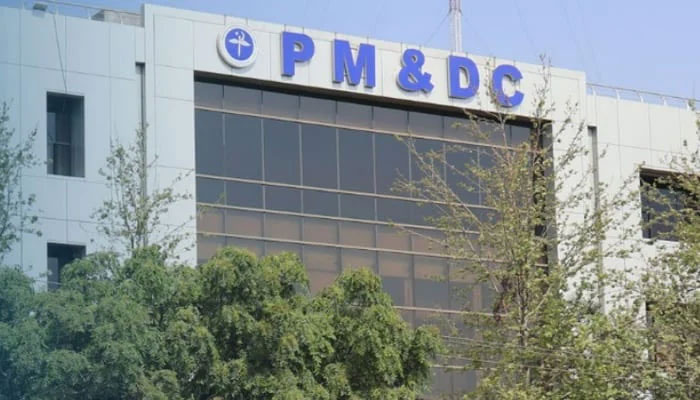PMDC seeks action plan to improve MDCAT standards
Islamabad : The MDCAT Reform Committee, established by the Pakistan Medical & Dental Council (PM&DC), has created three sub-committees to streamline reforms for the Medical and Dental College Admission Test (MDCAT).
These sub-committees, formed during the inaugural meeting held at the PM&DC office on Wednesday, have been tasked with drafting a unified syllabus, proposing e-assessment systems, and formulating policy guidelines to improve the examination process and regain public trust.
The MDCAT Syllabus Committee, comprising four members, will develop a unified syllabus that aligns with local and foreign educational boards. It will also draft a Table of Specifications for the exam and outline a plan for a sustainable question bank.
The E-Assessment Project Committee, with three members, is tasked with creating a secure question bank portal and proposing an e-assessment plan, including technical specifications and cost estimates.
Lastly, the two-member MDCAT Policy Document Committee will work on a comprehensive policy for the smooth implementation of the national exam.
These sub-committees were directed to submit their drafts by December, after which the action plan will be reviewed.
The Chairman of the reform committee emphasized the importance of delivering solutions that ensure transparency and credibility in the examination system.
During the meeting, Prof. Dr. Rizwan Taj, President of PM&DC, reiterated the council’s commitment to addressing the challenges faced by MDCAT, including concerns over recent controversies.
"We are deeply concerned about the misconduct that tarnished the system in this national exercise. The reform committee is tasked with establishing a robust system that restores public trust," he said.
The Chairman of the committee, Prof. Dr. Suhail Amin, highlighted the legal framework guiding the examination under the PM&DC Act 2022 and stressed the need for a unified syllabus and high-tech examination systems. He pointed out the necessity of enhancing cognitive-level assessments and incorporating critical thinking and ethical domains into the examination to align with global standards.
A detailed briefing on the performance of MDCAT 2024 was shared with the committee. A total of 167,772 candidates registered for the exam across Pakistan and international venues in Dubai and Saudi Arabia.
The committee was informed about challenges faced by examining universities, including errors in results and the need for retakes for some institutions in Sindh and under the Federal Government.
The committee members emphasised the importance of e-assessment systems to ensure accuracy and security, noting that such systems can be implemented effectively without relying on internet-based solutions.
The IBCC Chairman presented a comprehensive "Examination Bible" for grades 9-12, outlining procedures for question bank development and exam protocols, which could serve as a foundation for MDCAT reforms.
The committee acknowledged gaps in the current system, particularly the predictive validity of test scores and the inconsistency in difficulty levels across provinces.
It was highlighted that many entry tests globally assess higher cognitive abilities to evaluate candidates' potential as future health professionals.
Dr. Taj further noted the importance of addressing public concerns and reaffirming the PM&DC’s dedication to ensuring fairness in MDCAT. "We must prevent such occurrences and take comprehensive steps to ensure long-term sustainability and accountability," he remarked.
In his closing remarks, the Chairman thanked the committee members for their valuable input, reiterating the need to submit actionable drafts promptly to drive the reform process forward.
-
 Cuba-Canada Travel Advisory Raises Concerns As Visitor Numbers Decline
Cuba-Canada Travel Advisory Raises Concerns As Visitor Numbers Decline -
 Anthropic Buys 'Super Bowl' Ads To Slam OpenAI’s ChatGPT Ad Strategy
Anthropic Buys 'Super Bowl' Ads To Slam OpenAI’s ChatGPT Ad Strategy -
 Prevent Cancer With These Simple Lifestyle Changes
Prevent Cancer With These Simple Lifestyle Changes -
 Air Canada Flight Diverted St John's With 368 Passengers After Onboard Incident
Air Canada Flight Diverted St John's With 368 Passengers After Onboard Incident -
 Experts Reveal Keto Diet As Key To Treating Depression
Experts Reveal Keto Diet As Key To Treating Depression -
 Inter Miami Vs Barcelona SC Recap As Messi Shines With Goal And Assist
Inter Miami Vs Barcelona SC Recap As Messi Shines With Goal And Assist -
 David Beckham Pays Tribute To Estranged Son Brooklyn Amid Ongoing Family Rift
David Beckham Pays Tribute To Estranged Son Brooklyn Amid Ongoing Family Rift -
 Jailton Almeida Speaks Out After UFC Controversy And Short Notice Fight Booking
Jailton Almeida Speaks Out After UFC Controversy And Short Notice Fight Booking -
 Extreme Cold Warning Issued As Blizzard Hits Southern Ontario Including Toronto
Extreme Cold Warning Issued As Blizzard Hits Southern Ontario Including Toronto -
 Lana Del Rey Announces New Single Co-written With Husband Jeremy Dufrene
Lana Del Rey Announces New Single Co-written With Husband Jeremy Dufrene -
 Ukraine-Russia Talks Heat Up As Zelenskyy Warns Of US Pressure Before Elections
Ukraine-Russia Talks Heat Up As Zelenskyy Warns Of US Pressure Before Elections -
 Lil Nas X Spotted Buying Used Refrigerator After Backlash Over Nude Public Meltdown
Lil Nas X Spotted Buying Used Refrigerator After Backlash Over Nude Public Meltdown -
 Caleb McLaughlin Shares His Resume For This Major Role
Caleb McLaughlin Shares His Resume For This Major Role -
 King Charles Carries With ‘dignity’ As Andrew Lets Down
King Charles Carries With ‘dignity’ As Andrew Lets Down -
 Brooklyn Beckham Covers Up More Tattoos Linked To His Family Amid Rift
Brooklyn Beckham Covers Up More Tattoos Linked To His Family Amid Rift -
 Shamed Andrew Agreed To ‘go Quietly’ If King Protects Daughters
Shamed Andrew Agreed To ‘go Quietly’ If King Protects Daughters




